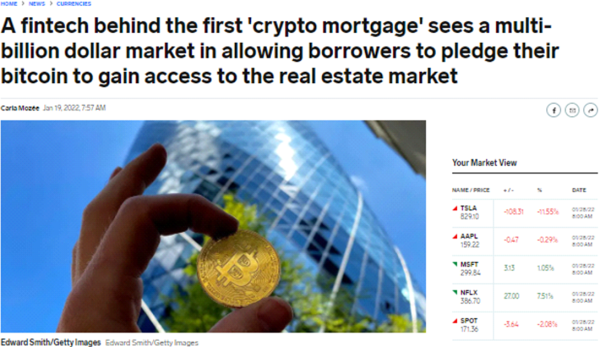If you would like to receive weekly updates like this, sign up here.
Would you sign up for a crypto-backed mortgage?
One that can be 30 years in length and 100% loan to value ratio (which means no money down) simply by pledging your personally owned Bitcoins.
Sounds downright compelling, no?
Well, these types of loans aren’t a pipe dream, but soon will be a reality as soon as this year.
 Source: Business Insider
Source: Business Insider
However, maybe if you do own Bitcoin, you may not want to use them to secure a mortgage, perhaps you’d like to ‘stake’ them instead and secure a return on them.
How does a 14% interest rate sound?
Welcome to a whole new world of finance. One that is clearly about to take off around the globe.
But all that glitters isn’t gold!
There is a very nasty sting in this tail. One that participants in this new world of finance can scarcely imagine.
Want to know what it could possibly be?
Read on.
Fortune favors the brave.
Firstly, let’s take a moment to dive deeper into these new crypto back mortgages.
This way it will give context to the bigger picture. I will get to that bigger picture in a moment.
Milo is the name of the company who are set to release these new finance products.
From the Business Insider article.
The company, Milo, said its 30-year, low-interest rate US crypto mortgage will allow potential borrowers to pledge their bitcoin to purchase property and qualify in financing 100% of the purchase with no dollar down payments required. Loans have been granted in an early-access stage, with the product slated to be available to most applicants in early 2022.
So straight away, it’s about chasing the rent, isn’t it?
Just another of many stories relating to how the 18-6-year Real Estate Cycle continues to turn.
What’s the attraction anyway, why not just apply for a ‘normal’ mortgage? It’s a fair question.
Per the article.
“I think this product really is a game-changer for many, many people. It accomplishes a lot of the aspects of what this consumer wants, which is to just continue to hold their bitcoin and be able to diversify and buy real estate – another fantastic wealth-creating asset,” Milo CEO Josip Rupena told Insider in an interview.
Holders of (for now) Bitcoins can have their cake and eat it too. Keep your Bitcoin, avoid large and substantial capital gains tax and use them as collateral to buy an income producing asset.
Then there is ‘staking’.
You may not have heard this term before, particularly in relation to crypto coins.
Here is an explanation form the website Binance Academy.
You may think of staking as a less resource-intensive alternative to mining. It involves holding funds in a cryptocurrency wallet to support the security and operations of a blockchain network. Simply put, staking is the act of locking cryptocurrencies to receive rewards.
The algorithm that secures transactions on a cryptocurrency ledger is termed a ‘proof of work’.
Bitcoin’s proof of work was the original, and due to market cap, remains the dominant one today.
It is though a very time, cost and energy consuming process. Is there a better way?
There is, via the process known as Proof of stake (or just staking).
Enter Proof of Stake. The main idea is that participants can lock coins (their “stake”), at intervals, the protocol randomly assigns the right to one of them to validate the next block. Typically, the probability of being chosen is proportional to the amount of coins – the more coins locked up, the higher the chances
This way, what determines which participants create a block isn’t based on their ability to solve hash challenges…Instead, it’s determined by how many staking coins they are holding.
Basically, as a crypto holder, you can basically loan your own personal portfolio to stake and in return you receive an interest payment on each block built on the blockchain via staking.
How lucrative is it?
According to websites like Crypto.com or Nexo.io it can return up to 14% interest.
In a world of negative rates, it’s kind of a home run don’t you think?
This is what is meant when you hear the term “A new digital form of finance”.
A revolution that allows users to escape the old, tired and outdated experience of dealing with legacy banks and embrace a totally new, fast and efficient way to take control of your financial life, all from your own smart phone.
Right?
No, not quite.
I could see that forest if it wasn’t for all the trees.
There is nothing new under the sun.
What you are seeing here, even if most of it didn’t make much sense, is simply the real estate cycle doing what it does.
It’s simply a new way to part you from your money at the end of the day.
Mortgage-backed securities were created during the last cycle, taking full advantage of the rise in land prices. It happens during each specific cycle.
Before them, it was derivatives. The cycle before that, it was Real Estate Investment Trusts.
It’s a guaranteed part of every real estate cycle in history. A new form of money or finance.
And what ends up happening is eventually, these new forms of finance end up being directly involved in the land market.
That’s why Milo is about to launch their new crypto related mortgages.
Because its ‘time’ for them to appear.
Milos’s founder is Josip Rupena. Below is how he explained the rational of crypto backed mortgages.
“And at the same time, the biggest concern for (our customers) is the opportunity cost over the existence of a bitcoin and digital assets. We’ve seen that over time it increases and appreciates, and has been appreciating,” he said. “It’s different for someone who has crypto than someone who lives in the conventional dollarized world. They really don’t want to sell their crypto.”
All borrowers must do is service the debt, either using cryptocurrency or the rent.
Once you understand how the real estate cycle works; you’ll already appreciate when the set-up is in.
And for this, oh boy, the set-up is in. Check it out (emphasis by me).
Like other crypto loans, Milo’s crypto mortgage has a margin-call component.
“If the crypto does go down by a certain amount … they could be subject to that. But they do have the opportunity to pledge more to mitigate against those factors,” said Rupena. He said transactions are structured to minimize the impact of price volatility.
What do you know! Even if your property rises 100% in a year, if Bitcoin drops by 50%, or more, expect a friendly phone to call to pledge more crypto.
Oh, the devil in the detail. Can you see now why this is a colossal set-up?
What happens next when BOTH property and Bitcoin start to fall off a cliff?
You don’t need to ask me, simply go back and study history. Each peak then bust of every real estate cycle tells its own story.
All that’s happened here is ensuring this cycle will be the biggest ever. Therefore, the consequences of getting this wrong may prove beyond most people ability to ever recover from.
Maybe though, if you could be good with the timing, perhaps there IS an opportunity here with these new forms of finance to accelerate your own portfolio?
And then use this knowledge to sell up and get out before those “friendly phone calls” become an avalanche.
Start here; with a membership to the Boom Bust Bulletin.
It will teach you the history of the 18.6-year Real Estate Cycle, why it continues to repeat and guide you to the very best opportunities the cycle presents.
Make no mistake, there is a window here to really maximize any crypto assets you may hold and turn these into income producing assets you can hold for the long term.
But do you know exactly how to do this, and would you recognize the right times to buy and then deleverage or sell?
You may, but a little extra help with these decisions never goes astray.
You can get this type of guidance and balanced research for just $4USD a month.
That’s a takeaway coffee a week! Amazing value.
Best wishes,

Darren J Wilson
and your Property Sharemarket Economics Team
P.S. – If you would like to receive weekly updates like this, sign up here.
P.P.S – Find us on Twitter here and go to our Facebook page here.
This content is not personal or general advice. If you are in doubt as to how to apply or even should be applying the content in this document to your own personal situation, we recommend you seek professional financial advice. Feel free to forward this email to any other person whom you think should read it.



